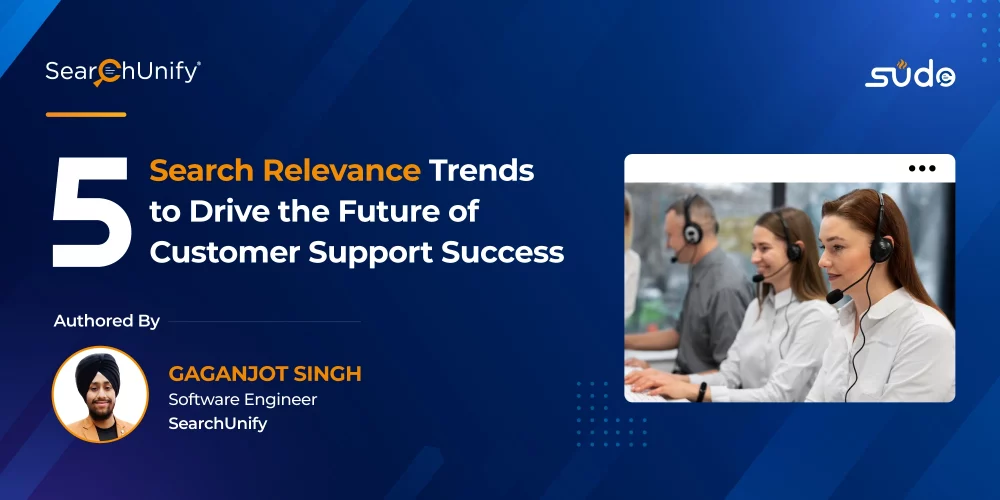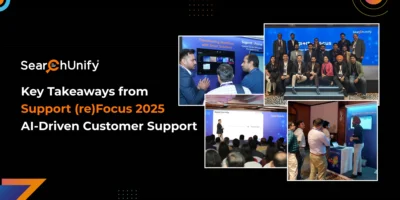
Did you know? 89% of consumers run to a competitor after a poor user experience.
In this fast-paced digital era, where competition is fierce and user expectations are sky-high, mastering the art of delivering exceptional user experiences is the need of the hour. And at the heart of this quest for supremacy lies one vital element: search relevance.
After all, your users demand nothing but the most precise and relevant search results, tailored to their specific needs and preferences. It’s a challenging endeavor, but staying up-to-date with trends and tips is the way to success.
In this blog post, get ready to be inspired and equipped with the knowledge you need to take your enterprise to new heights. Whether you’re a seasoned professional looking to fine-tune your search relevance game or a newcomer seeking guidance, this blog is your go-to source for all things B2B search relevance. Let’s get started!
5 Key Search Relevance Trends to Embrace
Here are five search relevance trends that are shaping the future of customer support and user experiences:
- Vector Search
Vector search contributes to search relevance by efficiently narrowing down the search space and identifying items that are most likely to be of interest to the user. By leveraging vector representations and similarity metrics, it can quickly retrieve items that share similar characteristics, making the search process more accurate and efficient. Additionally, vector search techniques allow for scalability, making it feasible to handle large datasets with high-dimensional vectors and real-time search requirements.For instance, when browsing an online bookstore, advanced vector search technology effectively filters through millions of book titles to suggest personalized reads for each customer based on their distinct preferences and previous purchases. This guarantees a precise and enjoyable shopping experience.
- Search Metrics
In the realm of search metrics, precision, recall, Mean Reciprocal Rank (MRR), and Normalized Discounted Cumulative Gain (NDCG) are essential factors in evaluating information retrieval and search relevance. Among these metrics, NDCG holds significant importance. It serves as a widely used evaluation tool to measure the quality and effectiveness of ranking algorithms by assessing the relevance of search results in a ranked list. As search engines prioritize enhancing search relevance and user satisfaction, the application of NDCG is poised to gain prominence. By leveraging NDCG and other advanced evaluation metrics, search engines can fine-tune their ranking algorithms, personalize search results, and deliver more relevant and valuable outcomes to users, ultimately enriching the overall search experience.In a customer service call center, utilizing Normalized Discounted Cumulative Gain (NDCG) as an evaluation metric allows the team to refine their search ranking algorithms, ensuring that customers receive highly relevant and valuable solutions faster, ultimately improving their overall support experience.
- Multimodal Search
As technology continues to advance, the future of search relevance will embrace multimodal search. Businesses can expect search engines that seamlessly integrate text, voice, image, and video search capabilities. Voice-based searches, in particular, will gain traction, enabling B2B professionals to conduct hands-free searches while on the move. Embracing multimodal search will broaden accessibility and cater to the diverse preferences of users, solidifying a strong competitive advantage for B2B organizations.The adoption of multimodal search capabilities revolutionized the user experience for ABC Corp. They now offer seamless text, voice, image, and video search options—thus catering to diverse preferences and providing a competitive advantage.
- Data Privacy and Security
With data breaches and privacy concerns becoming prominent issues, the future of B2B search relevance will prioritize data security and user privacy. B2B search engines will implement robust encryption and adopt decentralized data storage to protect sensitive user information. Earning the trust of B2B clients will be crucial, and businesses that can demonstrate a commitment to safeguarding data will gain a significant edge in the market.Here’s an imaginary, but captivating tale that validates the above trend – TechSolutions faced a major data breach scare that threatened to expose confidential trade secrets and sensitive financial information. Fortunately, TechSolutions had implemented a robust enterprise search engine with stringent privacy policies, including top-tier encryption and decentralized data storage. When the breach attempt occurred, the powerful privacy measures kicked into action, preventing any unauthorized access to their critical data. Win-win!
- Ontologies and Knowledge Graphs
In the future, the trend of integrating ontologies and knowledge graphs into search engines is expected to revolutionize search relevance. These sophisticated approaches enable a deeper semantic understanding of user queries and indexed content, going beyond traditional keyword matching. With personalized knowledge graphs capturing user preferences and intent, search engines can deliver tailored and contextually relevant search results, enhancing user satisfaction. Moreover, the integration of diverse data sources and entity recognition capabilities ensures comprehensive and precise answers to complex queries. As context-aware search becomes more prevalent, these technologies will enable search engines to offer timely and location-specific information.Let’s take the example of TechSearch, an innovative search engine. The organization harnessed ontologies and knowledge graphs to revolutionize search relevance. With semantic understanding of user queries and personalized knowledge graphs, TechSearch delivered contextually relevant results, impressing users with its precision.
Discover the Path to Search Relevance Success – Start Today!
In today’s Google-driven world, intelligent search is the standard, and businesses must adapt and excel in this area, rather than being the exception. Embrace smart search practices to cater to your audience effectively and stay ahead in the age of search relevance. These trends aim to enhance user experiences, streamline support processes, and provide businesses with the tools they need to stay competitive in an increasingly digital and interconnected world.
Seeking assistance with your search? Feel free to reach out, and we’ll be delighted to engage in a discussion with you or offer a free trial!










